Table of Contents
Henry Ford, the founder of the Ford Motor Company, was one of the most influential figures in the automotive industry. His innovative ideas and business practices revolutionized the way cars were manufactured and sold, making them more affordable and accessible to the average person. In this article, we will explore the life and legacy of Henry Ford, examining his early years, his rise to success, and his lasting impact on the world. We will also discuss his controversial views and his complex relationship with his workers. Whether you are a car enthusiast, a history buff, or simply someone who is interested in the story of one of the most successful entrepreneurs of all time, this article will provide you with a comprehensive overview of the life and work of Henry Ford.
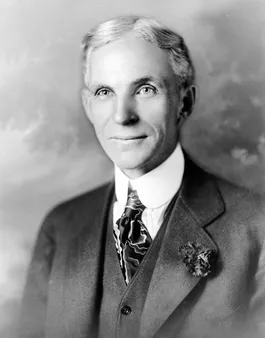
About Henry Ford: The Industrial Pioneer Who Revolutionized the Automobile Industry
I. Henry Ford: The Man Behind the Automobile
The automobile industry would not be where it is today without the contributions of Henry Ford. Born in 1863, Ford was a natural tinkerer and inventor from a young age. He left his family farm at 16 to work as an apprentice machinist in Detroit, Michigan. There he developed a passion for mechanics and engineering that would stay with him for the rest of his life. Read more
In 1896, Ford built his first automobile, which he called the Quadricycle. It was a small, simple vehicle with a 2-cylinder engine and 4 wheels. Ford drove the Quadricycle around Detroit, attracting a lot of attention from curious onlookers. He soon realized that there was a market for affordable, reliable automobiles, and in 1903, he founded the Ford Motor Company.Read more
Year | Model | Engine Size |
|---|---|---|
1903 | Model A | 2.0L I4 |
1908 | Model T | 2.9L I4 |
1917 | Model TT | 3.7L V8 |
- In 1908, Ford introduced a groundbreaking new automobile, the Model T.
- The Model T was the first mass-produced automobile, and it quickly became one to be one of the most popular cars in the world.
- The Model T was so successful because it was affordable, reliable, and easy to drive.
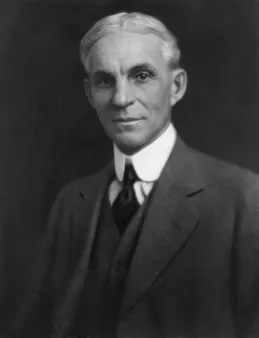
Henry Ford: The Man Behind the Automobile
II. Ford's Early Life and Career
Early Life
Henry Ford was born on July 30, 1863, on a farm in Greenfield Township, Michigan. He was the eldest of six children born to William and Mary Ford. His father was a farmer and his mother was a homemaker. Ford had little formal education, attending school only until the age of 15. He then left home to work as an apprentice machinist in Detroit.
In 1888, Ford married Clara Jane Bryant. The couple had one child, Edsel Ford, who was born in 1893. Ford continued to work as a machinist until 1899, when he quit his job to start his own company, the Ford Motor Company.
Ford Motor Company
The Ford Motor Company was founded on June 16, 1903, with an initial investment of $28,000. The company's first car, the Model A, was released in 1903. The Model A was a success, and Ford soon began to expand his company. In 1908, he introduced the Model T, which became one of the most popular cars in history.
Ford's success was due in part to his innovative use of the assembly line. The assembly line allowed Ford to mass-produce cars, which made them more affordable for the average consumer. Ford also paid his workers well, which helped to create a loyal workforce.
Later Life
Ford continued to lead the Ford Motor Company until 1945, when he retired. He died on April 7, 1947, at the age of 83. Ford is considered one of the most important figures in American history. He revolutionized the automobile industry and helped to create the modern world.
Year | Event |
|---|---|
1863 | Henry Ford is born. |
1888 | Ford marries Clara Jane Bryant. |
1899 | Ford quits his job to start his own company, the Ford Motor Company. |
1903 | The Ford Motor Company is founded. |
1908 | Ford introduces the Model T. |
1945 | Ford retires from the Ford Motor Company. |
1947 | Ford dies. |
- Ford was a self-taught engineer.
- Ford was a pioneer in the use of the assembly line.
- Ford was a generous philanthropist.
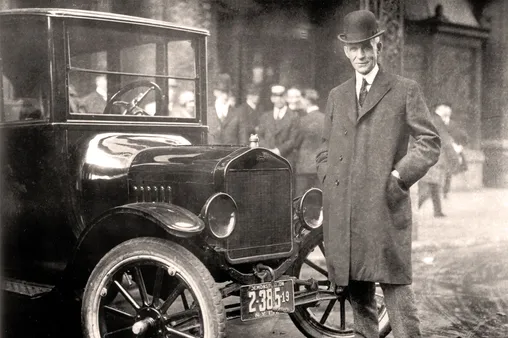
Ford's Early Life and Career
III. The Birth of the Ford Motor Company
In 1896, about Henry Ford built his first automobile, the Quadricycle. The Quadricycle was a one-cylinder, four-wheeled vehicle. This invention eventually transformed the transportation industry entirely.
- 1896: Henry Ford builds his first automobile, the Quadricycle.
- 1903: Ford Motor Company is founded.
- 1908: Ford introduces the Model T, the first mass-produced automobile.
- 1913: Ford begins using the assembly line to produce the Model T.
- 1927: Ford produces its 15 millionth Model T.
- 1945: Henry Ford dies at 83.
- 1956: Ford Motor Company is incorporated as a public company.
- 2003: Ford Motor Company celebrates its 100th anniversary.
In 1903, Ford Motor Company was founded. Ford introduced the Model T in 1908, the first mass-produced automobile. The Model T was affordable and easy to maintain, which made it popular with consumers. Ford began using the assembly line to produce the Model T in 1913, which further reduced the cost of production.
Year | Event |
|---|---|
1896 | Henry Ford builds his first automobile, the Quadricycle. |
1903 | Ford Motor Company is founded. |
1908 | Ford introduces the Model T, the first mass-produced automobile. |
1913 | Ford begins using the assembly line to produce the Model T. |
1927 | Ford produces its 15 millionth Model T. |
1945 | Henry Ford dies at 83. |
1956 | Ford Motor Company is incorporated as a public company. |
2003 | Ford Motor Company celebrates its 100th anniversary. |
Today, Ford Motor Company is still around and is one of the largest automakers in the world. Ford Credit is another one of its popular products. The company has a long history of innovation and has played a major role in the development of the automobile industry. Ford Credit is a popular lending source for new and used car buyers, as well as auto refinance options. You can learn more at Westernfordhcm.com.vn.
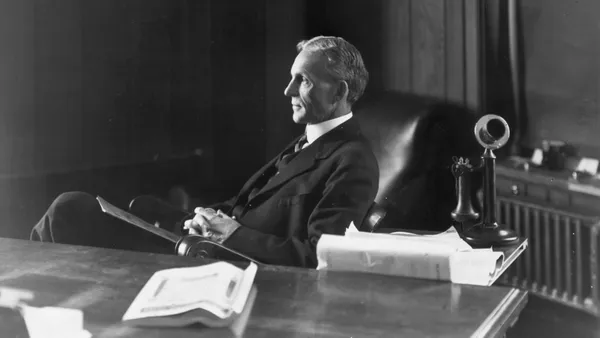
The Birth of the Ford Motor Company
IV. Ford's Impact on the Automotive Industry
One of the most influential figures in the automotive industry was Henry Ford. His Model T revolutionized the way cars were produced and made them affordable for the average person. Ford also developed the assembly line, which greatly increased the efficiency of car production. These innovations had a profound impact on the industry and helped to make Ford Motor Company one of the most successful companies in the world.
In addition to his contributions to the automotive industry, Ford was also a pioneer in the field of aviation. He founded the Ford Motor Company in 1903 and oversaw its growth into one of the world's largest automakers. He also established the Ford Foundation, which has become one of the largest philanthropic organizations in the world. Ford's legacy is one of innovation, entrepreneurship, and philanthropy.
Year | Model | Price |
|---|---|---|
1908 | Model T | $850 |
1917 | Model A | $395 |
1932 | Model B | $495 |
The Model T
The Model T was introduced in 1908 and quickly became the most popular car in the United States. It was the first car to be mass-produced on an assembly line, which made it affordable for the average person. The Model T was also a very durable and reliable car, which made it popular with farmers and other people who needed a sturdy vehicle.
The Model T remained in production for 19 years and sold more than 15 million units. It had a profound impact on American society and helped to make the automobile a common sight on the roads.
The Assembly Line
One of the most important innovations that Henry Ford introduced was the assembly line. The assembly line allowed cars to be produced much more quickly and efficiently than before. This led to a dramatic reduction in the cost of cars and made them affordable for the average person.
The assembly line also had a number of other benefits. It improved the quality of cars and made them more reliable. It also reduced the need for skilled labor, which made it possible to hire less experienced workers.
The Ford Foundation
In 1936, Henry Ford established the Ford Foundation. The Ford Foundation is a non-profit organization that supports research and education in the fields of arts, education, and the environment.
The Ford Foundation has awarded more than $14 billion in grants since it was founded. It has supported a wide range of projects, including the development of the polio vaccine, the creation of the Public Broadcasting Service, and the establishment of the Ford Motor Company Fund.
- The Model T was the first car to be mass-produced on an assembly line.
- The assembly line allowed cars to be produced much more quickly and efficiently than before.
- The Ford Foundation has awarded more than $14 billion in grants since it was founded.
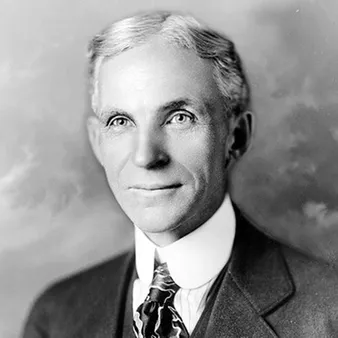
Ford's Impact on the Automotive Industry
V. Henry Ford's Legacy
Henry Ford's legacy is one of innovation, hard work, and determination. He was a pioneer in the automotive industry, and his Model T revolutionized transportation. He also founded the Ford Motor Company, which is one of the largest and most successful companies in the world. Ford's legacy extends beyond the automotive industry. He was also a philanthropist, and he established the Ford Foundation, which supports education, research, and other charitable causes.
Ford was born in 1863 on a farm in Dearborn, Michigan. He showed an early interest in mechanics, and he built his first car in 1896. In 1903, he founded the Ford Motor Company, and in 1908, he introduced the Model T. The Model T was a huge success, and it helped to make Ford one of the richest men in the world. Ford also developed the assembly line, which revolutionized the way cars were manufactured. He was a pioneer in the use of mass production, and he helped to make cars affordable for the average person.
Year | Event |
|---|---|
1863 | Henry Ford is born. |
1896 | Ford builds his first car. |
1903 | Ford founds the Ford Motor Company. |
1908 | Ford introduces the Model T. |
1913 | Ford develops the assembly line. |
1919 | Ford becomes one of the richest men in the world. |
1945 | Ford dies. |
Ford was a complex and controversial figure. He was a brilliant inventor and businessman, but he was also a ruthless competitor. He was accused of being anti-Semitic, and he was a strong supporter of Adolf Hitler. However, Ford's legacy is undeniable. He was one of the most important figures in the automotive industry, and he helped to shape the world we live in today.
- Ford was a pioneer in the automotive industry.
- He founded the Ford Motor Company.
- He developed the assembly line.
- He was one of the richest men in the world.
- He was a philanthropist.
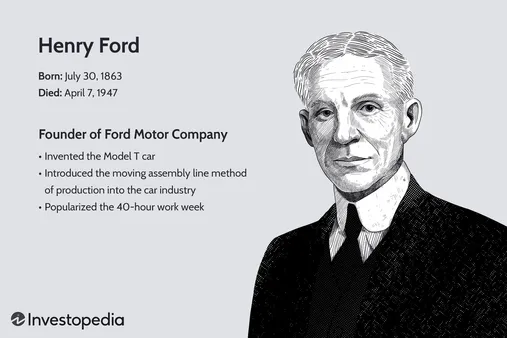
Henry Ford's Legacy
VI. Conclusion
Henry Ford was a visionary leader who revolutionized the automotive industry. His innovative ideas and business practices had a profound impact on the world, and his legacy continues to inspire entrepreneurs and business leaders today. Ford's story is a reminder that anything is possible with hard work, determination, and a willingness to take risks. He is a true American icon, and his contributions to society will never be forgotten.